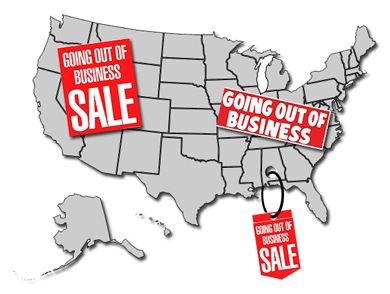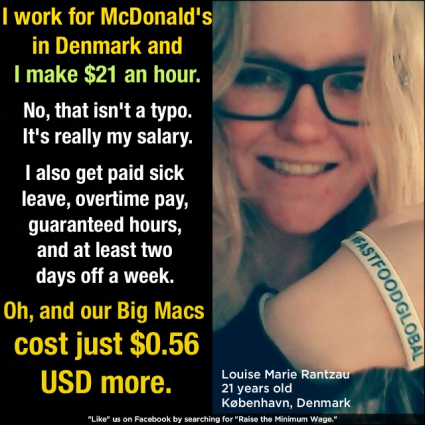September 15, 2014
By: Kelly Diamond, Publisher

I recently spoke with a Dane who was quick to laugh when I asked about his universal healthcare. He’s had several health problems, and has been given more bureaucratic run-around than actual care. He says that time with a doctor is reduced to 15 minute rations. (In some American HMO’s it’s down to 8 minute appointments.) Moreover, he was given a referral and an appointment to properly diagnose him, but that was six months off from the day he saw the first doctor.
Evidently, the income tax brackets range from 40% to 70%! So while I find it ridiculous that our income tax caps out at 40%, I’m utterly flabbergasted at the prospect of a 70% tax. Naturally, the more left leaning individuals would look at this and say, “See! We don’t have it so bad! What are you complaining about?”
Well, I’m complaining about theft, sweetheart.
What is oddly absent in all this taxation is any efficiency in government services. I would expect that being taxed at that rate would afford a population of 6 million better healthcare and better care for the elderly. Yet, that isn’t the case. They have a 180% tax on vehicles. Their cars nearly double in price from what is here in the US simply from the taxes alone. Their registration costs are based on weight, so naturally anyone who does have a car, keeps it light!
But what really gets me is this meme weaving its way around the internet:
$21 per hour? Really? And how much of that do you get to keep? Let’s say she is at the bottom of the income scale. $8 per hour goes to the government. Now she has $13 per hour left. What is the cost of living in Copenhagen? Is she getting a full 40 hours with that wage? And are the portion sizes identical to that of the US Big Mac?
If you look at the cost of living in a place like Copenhagen, you find that $13 per hour isn’t going to get you very far. That’s assuming you are working full time, which is not even addressed. That individual isn’t living much better than someone on the US minimum wage when all is said and done. Given the amount of tax they pay, they too are also likely on some form of government aid, which is also a grievance of the left leaners here in the US: “You don’t pay them enough so they still have to get on the welfare programs!” The same could be said about Danes.
I had someone tell me how much better the NHS is to American healthcare because it’s “free”. Then I come to find out that the UK… much like in Canada… is moving away from having medical doctors and more toward medical professionals. What’s the difference? Well, in a court of law that would be the difference between having a lawyer and a paralegal or legal secretary at your side. Not to say that each don’t have their role to play, but in the end, the lawyer doesn’t come into play until you go to court. Up until the moment of truth, you would be assisted by others in the field whose hourly rate is lower than that of a lawyer.
Makes sense that you would have a medical assistant take your vitals. I mean it doesn’t take a whole lot of medical knowledge to just take the readings and jot them down, right? It makes sense that the first level of evaluation would be done by a Registered Nurse. They know how to read the vitals and what would constitute an abnormal reading.
It makes sense that if they find something that isn’t quite right, they would report that to either a Nurse Practitioner or a Physician’s Assistant for further evaluation. They’ve had more training, albeit they are not actual doctors. Still, they work closely with doctors, so it’s practically the same thing.
What makes this all very interesting is that there aren’t many people becoming general practice doctors. There are people going to medical school, alright. And there are graduates! But they aren’t going into general practice because there’s no money in that, which leaves a wide vacancy for other medical professionals who can afford to be there in that capacity. These medical doctors are largely gravitating toward specialty medicine or even elective medicine.
Whereas there was a time when a doctor would treat everything from a boo-boo to an appendectomy, now doctors are left to bill their hours for only the really special moments. I even see it here in the United States! When I had my kids, I got some green leaf phlebotomist who needed a few tries at getting my I.V. needle into a vein. I had a know-it-all nurse who told me I had thirty minutes before it was time to push as I was telling her it was GO TIME! When my son was born, my doctor ran in and barely had enough time to get his second glove on before catching him.
Efficacy is how we save on cost. The costs don’t go away because they are socialized. There will be a point where effectiveness will be compromised for the sake of costs, at which point people will finally see what “free” really entails.
Finally, I would like to direct your attention for a moment to this interesting article comparing and contrasting the British economy with that of the United States. When adjusted for GDP and buying power, if Britain was incorporated into the United States as the 51st member of the union, it would fall just above Mississippi! It was later discovered by Forbes that if he had accounted for the buying power of each state individually rather than collectively as he did, Britain would fall below even Mississippi.
I won’t restate the entire analysis here, but it is rather interesting how Brits see the US economy. Some find Americans to be distastefully selfish, while others find Americans to still be better off in their model than even their own first world country.
It would seem that the only Americans who are worse off than their British counterparts are the bottom 5%.
This is by no means meant to be an apologetic or defense of American anything. I don’t look at other first world countries and find any solace whatsoever in the fact that they have it worse than I do. Theft is theft. America is in horrible financial shape. That it can still manage to not look like a used up crack whore on the global stage is either a grand testament to its manipulative smoke and mirrors tactics OR indicative of how far gone its first world comrades actually are.
The point of all this, in fact, is to show how volatile the first world is right now. Japan is in its third lost decade. The Eurozone is doing its damnedest to hold itself together. The non-Euro countries like Britain are not any better when pitted up against individual states.
The reality is, there is no one country that has any better economic footing than another. Sure, per capita, we can look at charts that say the US fairs better than Britain in one thing or another, but that’s vacuous considering what props up the USD in the first place: a printing press and faith.
The reality is, each geography might have something of value or benefit to offer, but you will need to research and diversify your life to get the best of what’s left in the world. Micro-funding in Laos, holding trusts in the Cook Islands, corporate structures in Nevis, banking in Singapore… What do you think happens in a free market when anything collapses or goes bankrupt? You swoop in and take what’s salvageable and let the rest go the way of the Dodo.
Click here now to set up a consultation with Bobby Casey to see what your options are.



Hey Kelly, did you ask about their vat tax???